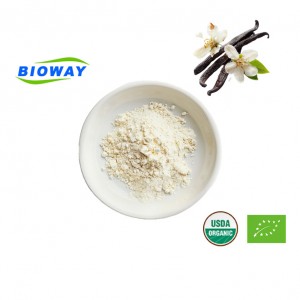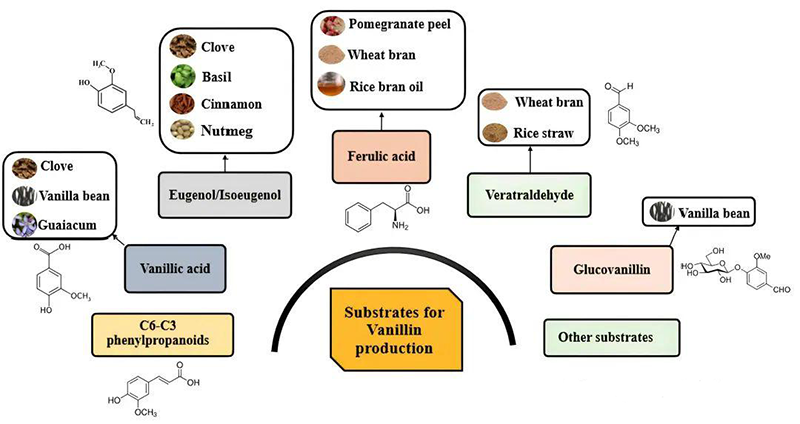I. Introduction
I. Introduction
The world of culinary arts is constantly evolving, with chefs and food enthusiasts alike seeking new and innovative ways to enhance the flavors and aromas of their culinary creations. One such innovation that has gained attention in recent years is the use of natural vanillin. Derived from plants such as vanilla beans, natural vanillin has the power to elevate the sensory experience of food and beverages, offering a wide range of culinary applications. In this article, we'll explore the origins of vanillin, its characteristics, and the impact it has on culinary creations, as well as its potential to enhance consumer experiences.
II. Understanding Natural Vanillin
Natural vanillin powder is a natural flavoring compound with a sweet and rich vanilla flavor. It is commonly used as a substitute for pure vanilla extract in food and beverage products. There are different sources of natural vanillin, and two common types are vanillin ex ferulic acid natural and natural vanillin ex eugenol natural, which makes it more competitive in the global market. The former is derived from ferulic acid, while the latter is derived from eugenol. These natural sources provide unique characteristics to the vanillin powder, making them suitable for different applications and flavor profiles.
III. Enhancing Culinary Creations
One of the key characteristics of natural vanillin is its ability to impart a rich and complex flavor profile to culinary creations. When used in foods and beverages, natural vanillin can add depth and complexity, balancing and enhancing the existing flavors to create a more well-rounded sensory experience. Its aromatic properties can also contribute to creating a more enticing and inviting culinary experience, enticing the senses and stimulating the appetite.
In the realm of pastry and confectionery, natural vanillin is widely appreciated for its ability to impart a distinct and alluring vanilla flavor to a wide range of baked goods, confections, and desserts. Whether used in a classic vanilla sponge cake, a rich and creamy custard, or a delicate macaron shell, natural vanillin can elevate the flavor profile of sweet treats, adding a touch of sophistication and depth to the end product. Its warmth and complexity make it a valuable ingredient in pastry creations, enhancing the overall sensory experience and delighting the palates of consumers.
In addition to its application in sweet dishes, natural vanillin can also be used to enhance the flavors of savory culinary creations. When used in spice blends, marinades, sauces, and dressings, it can add a subtle hint of sweetness and complexity, providing a new dimension to the overall flavor profile of savory dishes. Its aromatic qualities can also contribute to creating a more well-rounded and inviting sensory experience, enticing diners and enhancing their enjoyment of the meal.
Beyond its role in enhancing the flavor and aroma of culinary creations, natural vanillin also offers a number of additional benefits. As a natural ingredient, it appeals to consumers seeking clean label products and transparency in food and beverage formulations. In an era where consumers are increasingly mindful of the ingredients in their food and beverages, natural vanillin provides a natural and authentic option for enhancing the sensory experience of culinary creations.
Moreover, the use of natural vanillin aligns with the growing consumer demand for natural and sustainable ingredients. With an increasing emphasis on environmental sustainability and ethical sourcing, the use of natural vanillin derived from sustainable and responsibly sourced vanilla beans resonates with consumers who prioritize eco-friendly and socially responsible products. By choosing natural vanillin, chefs and food manufacturers can demonstrate their commitment to using ingredients that are not only flavorful and aromatic but also sustainable and environmentally conscious.
In the realm of beverage creation, natural vanillin offers an array of possibilities for enhancing the sensory experience of drinks. Whether used in alcoholic beverages, such as cocktails and spirits, or non-alcoholic beverages, including coffee, tea, and soft drinks, natural vanillin can impart a subtle and alluring sweetness and depth of flavor, elevating the overall sensory experience for consumers.
In the realm of coffee, natural vanillin can be used to enhance the depth and complexity of the flavor profile, adding a touch of sweetness and warmth to the brew. When incorporated into espresso-based drinks, such as lattes and cappuccinos, natural vanillin can complement the robust and bitter notes of the coffee, creating a more well-rounded and satisfying flavor profile. It can also be used to enliven cold brews and iced coffees, providing a subtle hint of sweetness and warmth to the refreshing beverage.
Similarly, in the domain of tea, natural vanillin can add a layer of complexity and warmth to the flavor profile of various tea blends, enhancing the overall sensory experience for tea enthusiasts. Whether used in traditional black tea blends, aromatic herbal infusions, or delicate green teas, natural vanillin can contribute to a more well-rounded and enticing flavor profile, enticing consumers and enhancing their enjoyment of their favorite teas.
In the realm of cocktail creation, natural vanillin offers an array of opportunities for mixologists to enhance the flavor and aroma of their concoctions. Whether used in classic cocktails such as the Old Fashioned or the Manhattan, or in contemporary creations, such as craft cocktails and mocktails, natural vanillin can impart a subtle hint of sweetness and aromatic complexity, contributing to a more sophisticated and alluring drinking experience. Its versatility and depth of flavor make it a valuable addition to the bartender's toolkit, allowing for the creation of innovative and flavorful cocktails that captivate the palate and the senses.
Beyond the realm of alcoholic beverages, natural vanillin can also be applied in the creation of non-alcoholic drinks, including soft drinks, flavored waters, and functional beverages. By incorporating natural vanillin into these beverages, manufacturers can add a touch of natural sweetness and aromatic complexity, creating a more enjoyable and satisfying drinking experience for consumers. Its ability to enhance the overall sensory experience makes it a valuable ingredient for creating beverages that delight the palate and entice the senses.
The potential of natural vanillin extends beyond the realm of culinary and beverage creations, encompassing a wide range of applications in the food industry. From enhancing the flavor profile of dairy products such as ice cream, yogurt, and milk-based beverages to adding depth and complexity to snack foods, baked goods, and confections, natural vanillin offers a versatile and valuable tool for food manufacturers seeking to elevate the sensory experience of their products.
In the realm of dairy products, natural vanillin can be used to enhance the overall flavor profile, adding a touch of sweetness and aromatic complexity to ice cream, yogurt, and other dairy-based treats. Whether used in classic vanilla-flavored products or in more complex flavor combinations, natural vanillin can contribute to a more satisfying and indulgent sensory experience, enticing consumers and enhancing their enjoyment of these beloved dairy treats.
In the realm of snack foods, natural vanillin can be used to add a layer of complexity and aromatic depth to a wide range of products, including chocolates, cookies, and crackers. Whether used to enhance the flavor profile of a chocolate bar, add a touch of warmth and sweetness to a cookie, or infuse a cracker with a subtle hint of vanilla, natural vanillin can elevate the sensory experience of these snack foods, creating a more enticing and satisfying indulgence for consumers.
Moreover, the use of natural vanillin aligns with the clean label trend, providing food manufacturers with a natural and authentic ingredient to create products that resonate with the modern consumer. By choosing natural vanillin as an ingredient, food manufacturers can demonstrate their commitment to using natural and authentic flavors, appealing to consumers who prioritize clean label products and transparency in food and beverage formulations.
IV. The Future of Natural Vanillin in the Culinary World
The rising popularity of natural vanillin in culinary and beverage creations can be attributed to the growing consumer demand for authentic and natural flavors, as well as the increasing emphasis on sustainability and ethical sourcing within the food industry. As consumers seek out products that offer a more satisfying and indulgent sensory experience, natural vanillin provides a valuable tool for chefs, food manufacturers, and beverage creators to enhance the flavor and aroma of their creations, enticing consumers and elevating their overall enjoyment of food and beverages.
As the culinary landscape continues to evolve, driven by changing consumer preferences and a growing emphasis on quality, authenticity, and sustainability, the use of natural vanillin in culinary and beverage creations offers a promising avenue for chefs, food manufacturers, and beverage creators to elevate the sensory experience of their products. With its rich and complex flavor profile, its alluring aroma, and its natural and sustainable appeal, natural vanillin has the potential to play a significant role in shaping the future of culinary innovation, enticing consumers and enhancing their enjoyment of food and beverages.
The future of natural vanillin in the culinary world looks promising, as it continues to gain attention and recognition for its versatility and potential to enhance the sensory experience of food and beverages.
Natural vanillin, derived from sources such as vanilla beans and other botanicals, offers a rich and complex flavor profile, as well as alluring aromatic qualities. Its ability to add depth and complexity to culinary creations, whether sweet or savory, makes it a valuable ingredient for chefs and food enthusiasts seeking to elevate the flavor and aroma of their dishes.
In response to the growing consumer demand for clean label products and sustainable ingredients, natural vanillin provides a natural and authentic alternative to synthetic vanillin. Its appeal to environmentally conscious consumers aligns with the broader trend of ethical sourcing and sustainability within the food industry.
Furthermore, the applications of natural vanillin extend beyond traditional culinary uses, including its potential in enhancing the sensory experience of beverages, such as coffee, tea, cocktails, and non-alcoholic drinks. Its ability to add a subtle hint of sweetness and aromatic complexity makes it a versatile tool for mixologists and beverage creators seeking to delight the palate and captivate the senses.
As the demand for authentic and natural flavors continues to grow, natural vanillin is poised to play a significant role in shaping the future of culinary innovation, enticing consumers, and enhancing their enjoyment of food and beverages. Its potential to contribute to a more satisfying and indulgent sensory experience positions it as a valuable ingredient for chefs, food manufacturers, and beverage creators alike.
Contact Us
Grace HU (Marketing Manager) grace@biowaycn.com
Carl Cheng ( CEO/Boss ) ceo@biowaycn.com
Website: www.biowaynutrition.com
Post time: Mar-07-2024











